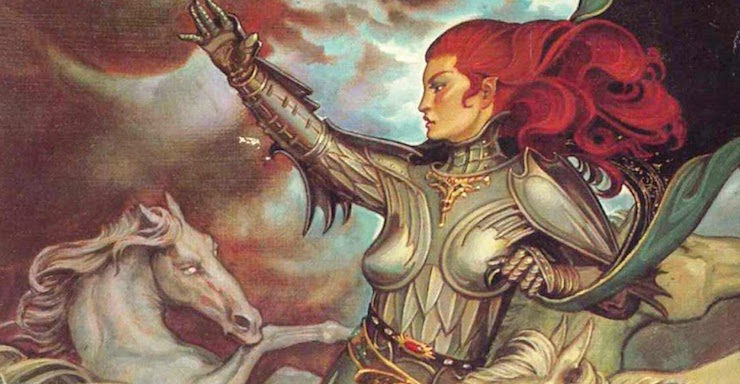Science fiction and fantasy have been around for centuries. Millennia, depending on which criteria you prefer. Only in the twentieth century did they coalesce into the genre-spectrum they are today, and begin to win large-scale popular and commercial success.
But humans forget. Here are five books by a mere sampling of the writers from the recent past whom we must not forget.
Jirel of Joiry by C. L. Moore
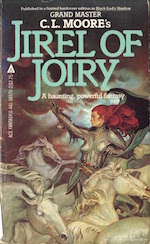 Catherine Lucille Moore (1911-1987) had to use her gender-neutral initials to get published in the 1930s. That didn’t stop her creating the fledgling genre of sword and sorcery’s first female protagonist in Jirel of Joiry. As brave, capable, and arrogant as any man, yet far from invulnerable, Jirel was more than just a red-haired, female Conan. While her adventures were clearly influenced by Robert E. Howard, as well as by Moore’s and Howard’s literary acquaintance H. P. Lovecraft, they focus less on her sword-swinging than her spirit and furious determination. A curious blend of compassion and cruelty, she’s a pious Catholic who’ll risk damnation to gain the means to overcome her foe—then brave the very Hell she sent him to, to free his soul from eternal suffering.
Catherine Lucille Moore (1911-1987) had to use her gender-neutral initials to get published in the 1930s. That didn’t stop her creating the fledgling genre of sword and sorcery’s first female protagonist in Jirel of Joiry. As brave, capable, and arrogant as any man, yet far from invulnerable, Jirel was more than just a red-haired, female Conan. While her adventures were clearly influenced by Robert E. Howard, as well as by Moore’s and Howard’s literary acquaintance H. P. Lovecraft, they focus less on her sword-swinging than her spirit and furious determination. A curious blend of compassion and cruelty, she’s a pious Catholic who’ll risk damnation to gain the means to overcome her foe—then brave the very Hell she sent him to, to free his soul from eternal suffering.
And you’ll never catch Jirel in a mail bikini. She wears the same practical armor as any other warrior of her unspecified Medieval period would.
Moore’s writing is brisk, strongly sensory, and evocative of settings Earthly and alien, though flavored with a few too many adjectives for the modern palate. She had a long and successful career with Jirel and the space opera adventures of Northwest Smith, then writing in collaboration with her husband, Henry Kuttner. Jirel of Joiry is a collection of most of the Jirel tales.
The Planetary Adventures of Eric John Stark by Leigh Brackett
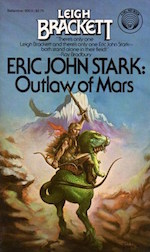 While you may not have heard of Leigh Brackett (1915-1978), you’ve heard of her screenwriting work. Maybe not The Big Sleep or Rio Lobo, but how about The Empire Strikes Back? While the final script is credited to Lawrence Kasdan, her influence on what’s widely considered the best of the Star Wars films is marked – here’s a great vindication of her contribution to it by Charlie Jane Anders.
While you may not have heard of Leigh Brackett (1915-1978), you’ve heard of her screenwriting work. Maybe not The Big Sleep or Rio Lobo, but how about The Empire Strikes Back? While the final script is credited to Lawrence Kasdan, her influence on what’s widely considered the best of the Star Wars films is marked – here’s a great vindication of her contribution to it by Charlie Jane Anders.
A vigorous, proficient writer who, like Moore, brought depth to her swashbuckling characters, Brackett wrote space opera at a time when it was widely disdained, even among fellow SF writers, as “mere pulp,” simply because she wanted to. “I suppose most of my stuff would be called escape fiction,” she said. “This is the type of stuff I love to read.” Which goes for me as well.
Indeed, the reason George Lucas called Brackett in to work on Empire—aside from the fact he thought she was a man—was not her prior film success, but because of her “pulp science fiction” stories. These were strongly influenced by Edgar Rice Burroughs’ “planetary romances” like the Barsoom series, and often starred this collection’s protagonist, Eric John Stark.
The Dragon Masters by Jack Vance
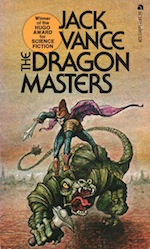 Jack Vance (1916-2013) is my favorite writer. Vance was a master stylist, whose remarkably rich descriptions, often picaresque characters, wry perspective, and unmatched ability to portray bizarre yet believable cultures, human and alien (his years spent traveling the world as an able seaman in the Merchant Marine may have something to do with that), gave him a powerful, distinctive voice.
Jack Vance (1916-2013) is my favorite writer. Vance was a master stylist, whose remarkably rich descriptions, often picaresque characters, wry perspective, and unmatched ability to portray bizarre yet believable cultures, human and alien (his years spent traveling the world as an able seaman in the Merchant Marine may have something to do with that), gave him a powerful, distinctive voice.
The Dragon Masters is a novella, sometimes sold bound as a book, which won the 1963 Hugo for Best Short Story. It’s classic space opera adventure, with Vance’s unique twist. Like much of his fiction it’s a rumination on human nature, with its quirks, virtues, extravagant vices, and malleability, shown directly and mirrored by aliens and humans’ interactions with them. “Dragon Masters” takes “malleability” literally, pitting human defenders against reptilian alien invaders on a far-off world, both sides fielding armies of specially-bred, monstrous versions of … each other. Its protagonist Joaz Banbeck, like many of Vance’s, is far from a spotless paladin. But despite his grey areas, he fights the good fight with wit and courage as well as compassion.
The Dragon Masters was also a key inspiration for and influence on my own Dinosaur Lords fantasy novels…
Berserker (Berserker Series Book 1) by Fred Saberhagen
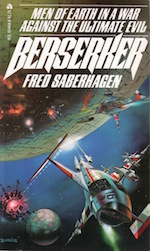 red Saberhagen (1930-2007) was a quiet, gracious man. He was also a friend, who with his wife, author Joan Spicci Saberhagen, entertained much of the New Mexican SF/F creators’ community at parties celebrating Edgar Allan Poe’s birthday. A master storyteller, he wrote a large number of novels and stories which spanned horror (The Dracula Tapes) and fantasy (The Books of Swords.) But he’s best known for his science fiction stories of the Berserkers—autonomous, intelligent killing machines hell-bent on ridding the galaxy of life.
red Saberhagen (1930-2007) was a quiet, gracious man. He was also a friend, who with his wife, author Joan Spicci Saberhagen, entertained much of the New Mexican SF/F creators’ community at parties celebrating Edgar Allan Poe’s birthday. A master storyteller, he wrote a large number of novels and stories which spanned horror (The Dracula Tapes) and fantasy (The Books of Swords.) But he’s best known for his science fiction stories of the Berserkers—autonomous, intelligent killing machines hell-bent on ridding the galaxy of life.
A champion of courage and compassion, with a strong moral center and a dry sense of humor, Saberhagen wrote gripping tales of the Berserker-human war in which he not only encompassed human foibles, but used them as strengths to combating the implacably hostile machines. The stories have been massively influential on science fiction, echoed by Star Trek’s Doomsday Machine (although episode writer Norman Spinrad based it on his own unpublished work, related works like The Star Trek Concordance call the Machine a “Berserker”) Battlestar Galactica’s Cylons, Mass Effect’s Reapers, and Skynet from the Terminator movies.
Berserker stories also helped hook me on SF as a child.
Happily these stories of murder-robots who turned on their creators have no relevance today, since it’s not as if DARPA is actively trying to develop autonomous killing machines. Oh, wait…
Lord of Light by Roger Zelazny
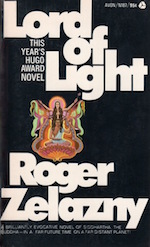 To me, Roger Zelazny (1937-1995) is SF/F’s greatest author, and Lord of Light is my favorite novel. Like Fred Saberhagen, Roger was a friend, a fellow New Mexican, and an all-around good guy. He was also a contributor to George R.R. Martin’s Wild Cards shared-world anthologies, as am I.
To me, Roger Zelazny (1937-1995) is SF/F’s greatest author, and Lord of Light is my favorite novel. Like Fred Saberhagen, Roger was a friend, a fellow New Mexican, and an all-around good guy. He was also a contributor to George R.R. Martin’s Wild Cards shared-world anthologies, as am I.
Deliberately blending fantasy and science fiction, Lord of Light is a beautiful, sprawling in scope yet tightly constructed grand adventure, with compelling and surprising characters, and technomagical settings so fantastic that, when a movie based on the novel was proposed in 1979, the filmmakers brought in comic book artist-god Jack Kirby to design the sets. (Asgard, in the MCU Thor movies? That’s Kirby’s vision, brought brilliantly to the screen.) The novel explores the nature of power, faith, and enlightenment – and the uses and misuses of both – with the heart and irreverent wit that marked Zelazny’s multifarious and multi-Hugo and Nebula-winning body of work.
Sadly, the Seventies movie never came about. But a fake production of it, renamed “Argo,” was used as cover for the “Canadian Caper” rescue of six US diplomats during the Iranian hostage crisis. And, yes, that’s the basis for 2012’s Best Picture Oscar winner, Argo.
Roger’s risk of being forgotten may drop precipitously if the proposed TV adaptation of Lord of Light comes to pass. But please, read this and other works by him, Moore, Brackett, Saberhagen, Vance, and other past writers—and keep our genre’s history alive.
 In previous worlds Victor Milán has been a cowboy and Albuquerque’s most popular all-night prog-rock DJ. The Dinosaur Princess, book 3 in The Dinosaur Lords series, is available now from Tor Books. He’s never outgrown his childhood love of dinosaurs, and hopes you didn’t either.
In previous worlds Victor Milán has been a cowboy and Albuquerque’s most popular all-night prog-rock DJ. The Dinosaur Princess, book 3 in The Dinosaur Lords series, is available now from Tor Books. He’s never outgrown his childhood love of dinosaurs, and hopes you didn’t either.










